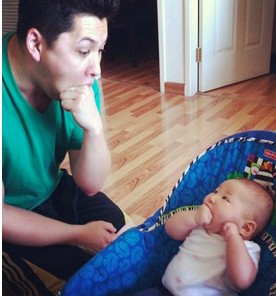 |
| Jason Lee spends quality time with his 6-month-old daughter. Photo: Courtesy of Jason Lee |
Since becoming a stay-at-home father, Jason Lee, 29, from California, had never regretted it, but on the day that he witnessed his baby daughter first starting to babble, he felt blessed and knew he had absolutely made the right choice.
A typical day for Lee is packed with washing, cleaning, shopping and feeding his 6-month-old daughter. Checking the air quality is also on his to-do list; he doesn't want to miss any opportunities to take the baby outdoors to play in the fresh air. Lee covers the day shift of childcare, and his wife pitches in when she comes home from her job.
It was Lee's idea to become a stay-at-home father. Though he liked teaching English at a Beijing university, he also wanted his wife to pursue her passion of working full-time at a nonprofit.
For the first few weeks, Lee occasionally felt isolated as his original plan to work part-time came up against the reality of caring for a newborn. "Work had been my social life," he said, but added that such feelings were more than balanced out by the joy of witnessing his daughter grow up day by day.
While Lee felt some ambivalence about leaving his job, Trevor Marshallsea, 46, an Australian who has lived in China for five years, committed to full-time fatherhood because he was ready for a change.
About a year after he and his wife had their first child, they decided to uproot themselves from Sydney. Marshallsea had spent 25 years in a journalism career that had become more stressful than enjoyable. Meanwhile, it was easy for his wife, a doctor, to find short-term work as they moved to various cities in Australia and eventually to China.
As Marshallsea became the primary caregiver for their two daughters, Lani, 8, and Evie, 6, he found himself enjoying new challenges, such as getting the children to eat things they didn't like. His daily routine involves getting the girls ready for school, helping them with homework and attending their music lessons. He blogs about his experiences on his website, tigerfather.com.
Lee hopes that having a full-time dad will help create happy memories for his daughter. Marshallsea wants to show his daughters that men can be nurturing; he also believes that fathers have a special role to play in teaching kids to be strong and independent.
Although it's not terribly controversial for a woman to stay home with the kids, people are still surprised when a man identifies himself as a stay-at-home dad, Marshallsea said. Lee agreed, saying that several people had questioned his decision to assume the role of full-time parent. He is a third-generation Chinese-American and his wife is Korean-American. In both families, Asian traditions dictated that man should be the breadwinner, Lee said.
Stay-at-home fatherhood has become more common as women's earning potential and leadership opportunities in the workplace have increased, Lee said. Moreover, it's no longer shameful for men to do housework, Marshallsea notes.
"Stay-at-home dads are generally at an advantage compared with stay-at-home mothers. We get congratulations and pats on the back everywhere. People generally think it's great, modern and progressive, etc.," Marshallsea said, noting that mothers usually don't get the same level of applause.
Lee said that he hasn't seen many Chinese men identifying as full-time fathers, but media have reported that the phenomenon is growing, with as many as two to three percent of families in Beijing having a stay-at-home dad.
 2013 Colour Me Rad 5K run held in Canada
2013 Colour Me Rad 5K run held in Canada China's destroyer Qingdao sails out of Sydney Harbor
China's destroyer Qingdao sails out of Sydney Harbor Chinese tycoon aims to restore London's Crystal Palace
Chinese tycoon aims to restore London's Crystal Palace Worst flooding hits Yuyao, 70% of downtown area underwater
Worst flooding hits Yuyao, 70% of downtown area underwater Game for the brave: 'Spiders' in Yandang Mountains
Game for the brave: 'Spiders' in Yandang Mountains Hungarian wingsuit flyer confirmed dead in Zhangjiajie
Hungarian wingsuit flyer confirmed dead in Zhangjiajie New couples take wedding photos during holiday
New couples take wedding photos during holiday Serena Williams stumbles through to quarterfinals
Serena Williams stumbles through to quarterfinals Thailand Mobile Expo 2013 kicks off
Thailand Mobile Expo 2013 kicks off Photo collection of Chinese Navy
Photo collection of Chinese Navy Photo story: Young tenants in Beijing
Photo story: Young tenants in Beijing Twins Culture Festival kicks off in Beijing
Twins Culture Festival kicks off in Beijing UNESCO world heritage site: Montale Tower
UNESCO world heritage site: Montale Tower Israeli drone crashes into Mediterranean, fragments recovered
Israeli drone crashes into Mediterranean, fragments recovered Serena Williams wins second China Open title
Serena Williams wins second China Open titleDay|Week|Month